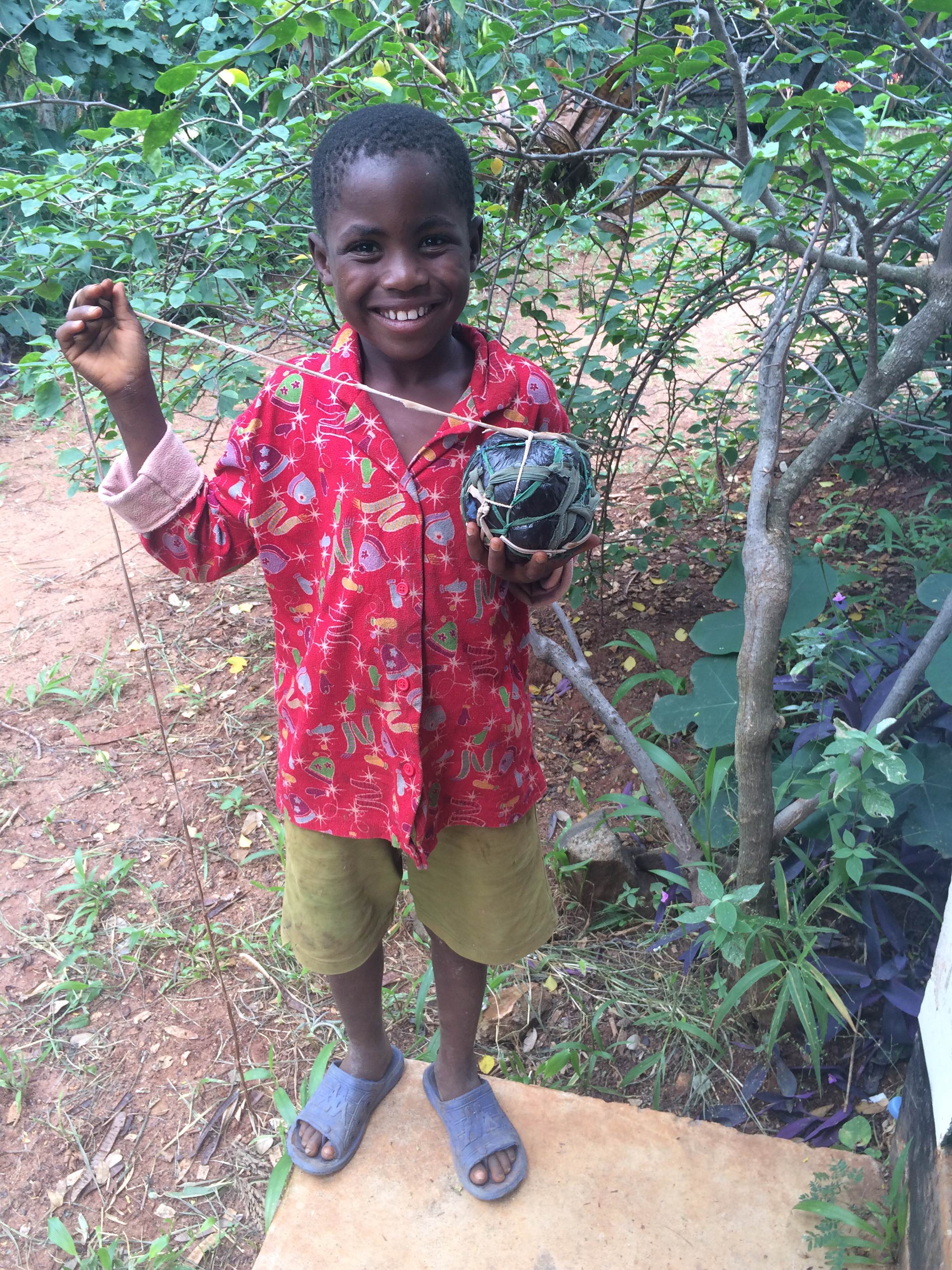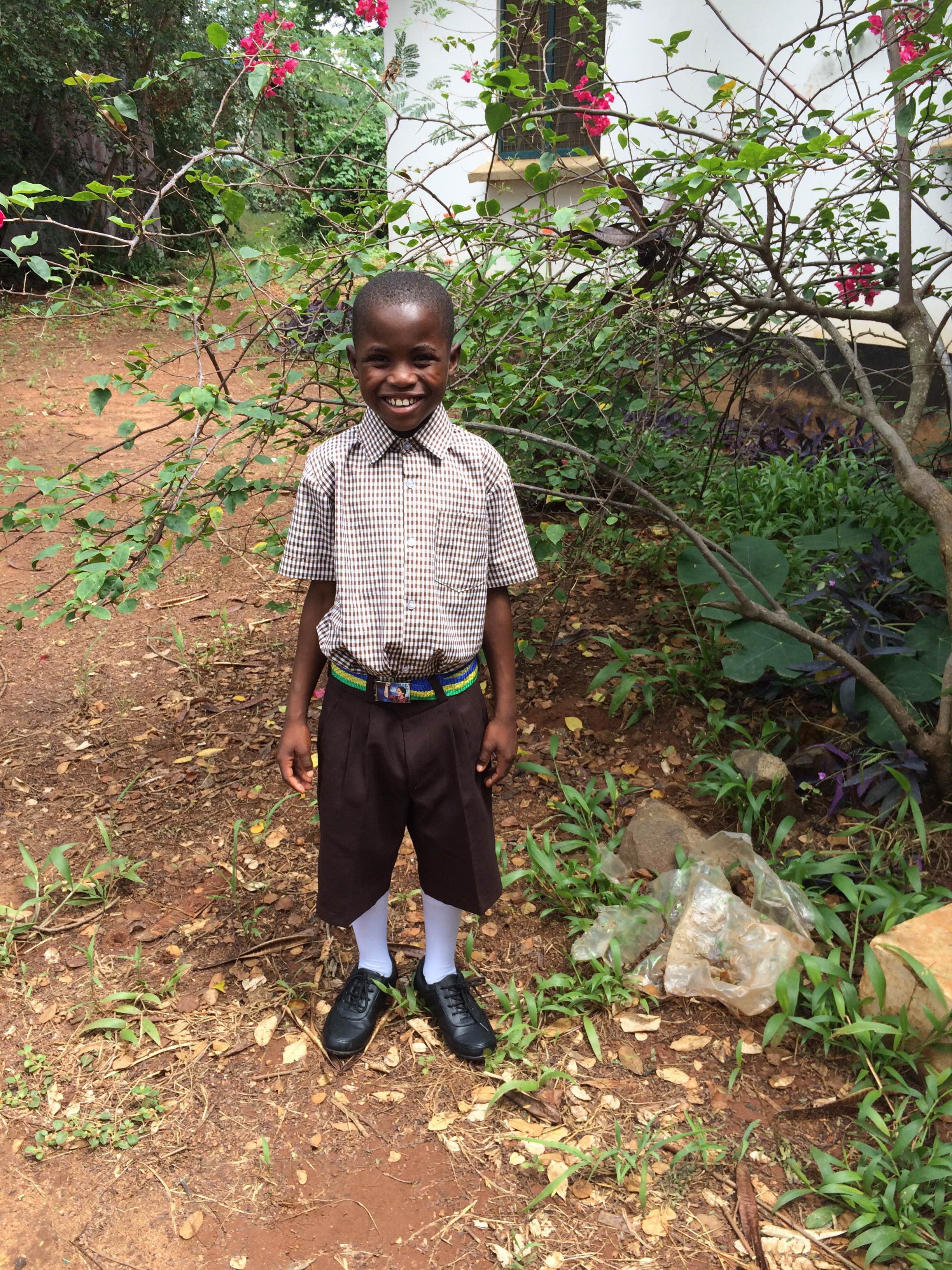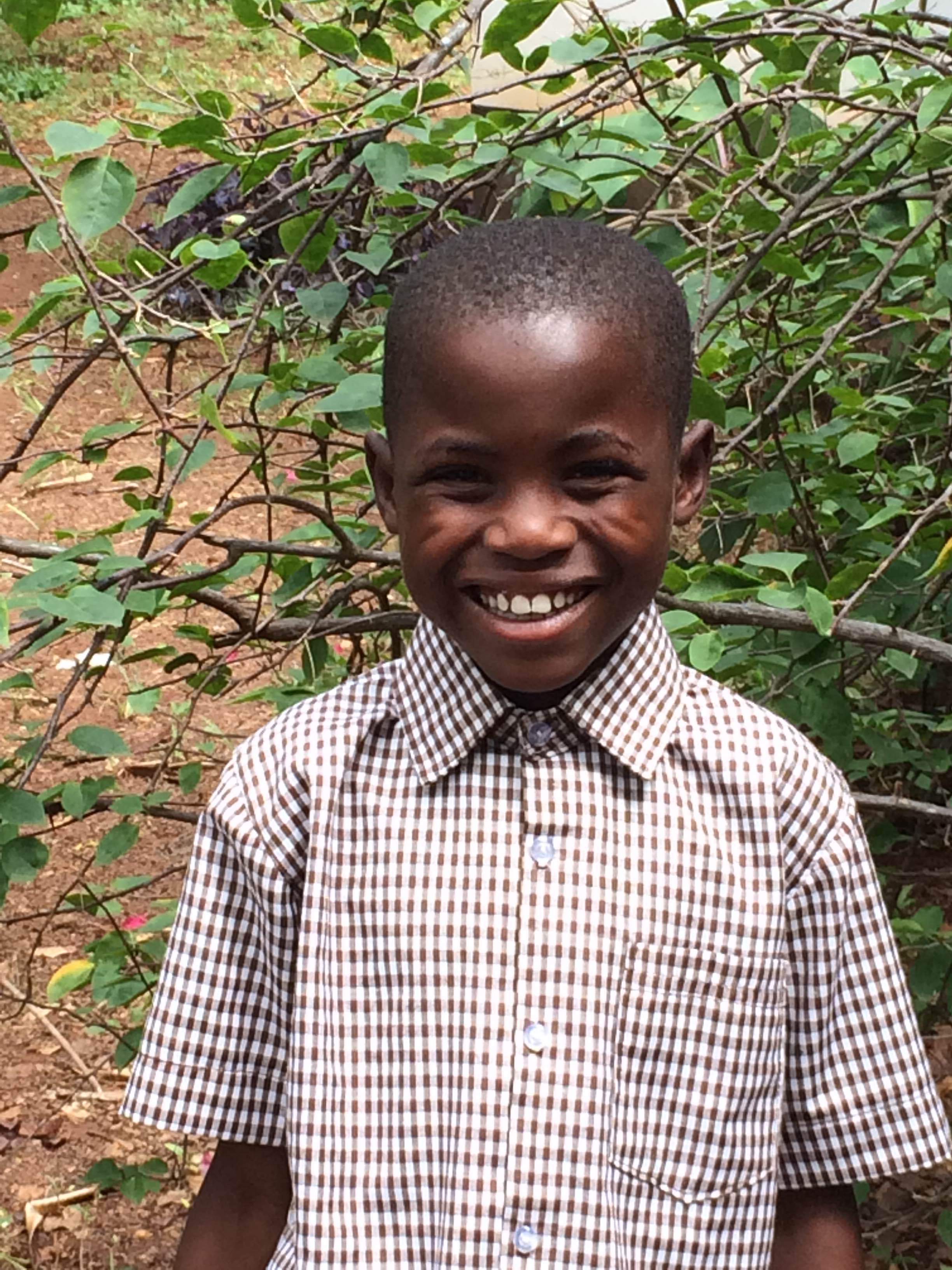This post is dedicated to Liz Clibourne.

Vasco in his Sunday Best. This is the cleanest I’d seen him to date. He’s holding what the children make for soccer balls. They have no torus, so they make them. The balls are made out of old plastic bags and held together with fabric or string. They actually work pretty good!
You don’t have to live in the village long before being indoctrinated into the Holy Trinity of Berega: there is little food and not much variety, there are a lot of hungry kids, and stealing from wazungu is okay because they can always get more (true, but annoying as hell).
“Hodi.” The traditional request to enter and visit comes from the back door. “Karibu,” Liz and I reply, “Welcome.” On the porch we find a typical village waif. Vasco has been here before as a tagalong with some of the Bishop Chitemo students. The Kaguru people tend to be short, so although he is nine, he looks like he’s six or seven. He has dark, liquid, hopeful puppy-dog eyes and a heart melting, disarming smile. He is also filthy. His ill-fitting clothes are literally rags, his skin covered in layers of red dust. Clothes and body are so embedded with dirt and grime, the original color of both can only be guessed. He has that village kid smell; a combination of dirt, smoke, sweat and stale urine. I see scraped knees, bruises, and broken sandals. Vasco has never been to school.
“Teacha.”
“Hello, Vasco. What do you want?”
“Teacha. Cuhlah.” He looks past me into the living room. His eyes scan everything in sight.
“You want to color?”
“Cuhlah. Papah,” he replies, and continues to scan.
“Alright Vasco. Sit down. I’ll get them.”
“Teacha. Cuhlah.” Scan.
“Ndiyo. Yes.” Neck crane – scan.
Armed with a box of crayons and some scratch paper, he settles himself into a porch chair and entertains himself.
“Okay, Vasco. Time to go home. Naenda nyumbani.”
“Teacha. Chupa.”
“Chupa? Bottles?” I hold up an empty water bottle. “You want bottles? He nods. “Alright. Enjo. Karibu.” Come here. Come in.
He doesn’t need our bottles. You can pick them up from any fire pit or road side in the village. He just wants to have something to call his own and show off to his buddies. From her position on the couch Liz studies the kid as he follows me through the living room into the kitchen where we keep the empty plastic bottles. His head systematically surveys the room.
“Look at him! He’s casing the place!” Liz chuckles from behind her book.
He was indeed, and he found his prize in the form of the mangoes in our fruit basket.
December is high mango season. At the sokoni in Morogoro, you can get all manner of mangoes from the small sun-yellow ones to the medium size green ones, to the huge orange and yellow ones. The latter are gold. You can’t get them in the village. The only mangoes you can get here have enough fiber to choke Euell Gibbons, and are picked green. You can find them right next to the green oranges, but you’re going to spend a week flossing the strings out of your teeth. Liz and I were on a layover in Berega before continuing on our Christmas travels. We had brought home several of the large mangoes.
“Teacha. Embe?” Mango? His hunger was pleading with us through his eyes.
To my shock and wonderment, Liz hands over one of the precious fruits. Liz does not share mangos. Neither can she resist an obviously hungry child. I thought Vasco’s eyes were going to jump right out of their orbits. He said, “Asante.” Thank you. He shot out of there faster than street-meat out of a mzungu.
The next day he brought reinforcements and stole the rest of our mangoes.
“Little thief!” I spat. Liz and I were discussing what to do. Those mangos were destined to be dinner. We had been looking forward to them all damn day. I felt betrayed. Hours later I was still madder than a wet cat.
Liz takes a sip of her coffee. “If we do nothing he figures he’s gotten away with it and one day he’ll either get his ass beat to death or get fired.” Getting “fired” involves one thief, one tire, a bit of rope, petrol, a mob, and at least one match.
“Right, but if we rat him out, he gets beat, and I mean beat, at home.”
“Well, considering they kill thieves around here, we need to find his Baba and tell him.” Liz said.
“Good point.”
But it’s not a good solution. Vasco has a reputation around the village as a thief. We want him to answer for his crime, but, at the same time, we want to protect the kid. I mean, he’s annoying as a saddle bur, but he’s only nine! We also recognize this kid is smart…a sneaky little thief, but smart. He is always thinking. Intelligent eyes can’t hide.
“Well then, Liz,” I said, throwing myself on the couch in distain. I was still a little pissed. “We have stolen mangoes and a smart kid. What the hell do you suggest we do?”
“Put him in school.”
“Excuse me?” I’m thinking maybe some of those mangos she’d eaten had fermented.
“Put him in school.” Oh yeah, they were definitely fermented. 100 proof.
“Liz. He’s nine, never been to school, doesn’t know squat, and has never had to behave. He’s a Wild Child, for god’s sake!”
“If he’s as smart as we think he is maybe he’ll turn it around.”
That is how The Mango Thief ended up sweeping our porch every morning for two weeks (to pay off the mangoes) and started the school year as the oldest kid in Chekechea (kindergarten).
He had a bit of a rough start – something about a torch getting stolen from the school choo (outhouse), passed around, broken. It earned him and a few others a little “vacation”. But, as it turns out, Liz nailed it. Vasco is a back porch regular now. He comes by several times a week to greet us in both Kiswahili and English. He still sweeps and takes great pride in it, even though he long ago paid off his debt. After he settles his broom neatly in the corner, he asks for paper and a pencil and practices writing his numbers and letters. Right from the start Teacher Martha taught him how to write his name. He carefully puts his name to paper, looks up at me and flashes that award-winning smile. Recently we’ve started conducting simple conversations in English. They’re only two or three sentences long, but we’re communicating. Today I noticed he is teaching himself sight words. What really gets me is straight out of the chute he decided every word I teach him in English, he would teach me in Kiswahili. If I try to get him to understand one complete sentence in English, he makes sure I can understand a sentence in Kiswahili. And he doesn’t let me get away with sloppiness!
“Good morning Teacha.”
“Good morning, Vasco. Did you come to greet us?”
“Yes, Teacha. May I sweep?” he asks, pronouncing each word carefully. He sets about making sure the porch is dirt and leaf free. But today, today is different. He doesn’t ask for his paper and pencil, or for me to read him a book. Today, instead of propping the broom up in it’s corner when finished, he leans on it, and looks me straight in the eye.
“Teacha,” he says.
“Yes, Vasco?”
“Teacha. Thank you for school.”

Brand new uniform, belt, socks and shoes. He was so proud!

That award winning, heart melting smile.
Such a beautiful story. God bless you and Liz and this little mango thief.
LikeLiked by 1 person